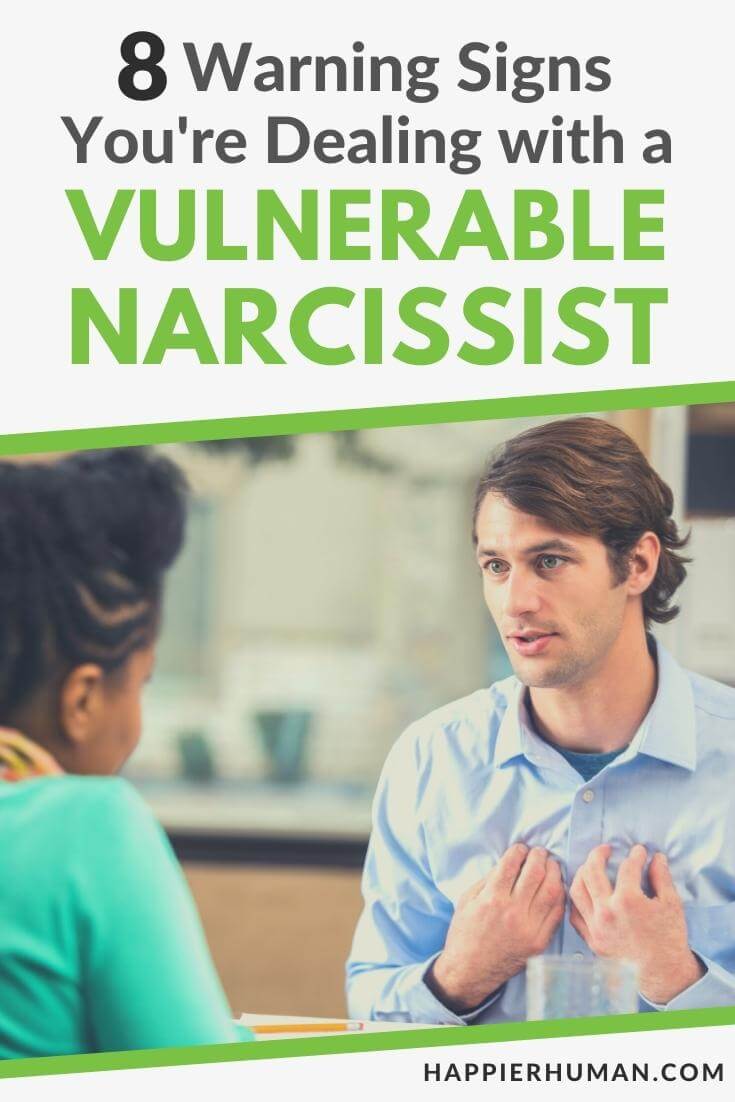We’ve all encountered many different types of people in our lives. Chances are you’ve had both good and bad relationships on your journey, whether romantic or platonic. But if you’ve ever known someone who seems self-absorbed, insecure, or lacks empathy, could there be a deeper issue at play? Could you actually be dealing with a vulnerable narcissist?
In this article, we’ll discuss what a vulnerable narcissist is, some warning signs that someone could be one and what to do about it.
What is a Narcissist?
Narcissism is a term you’ve probably heard before as it gets a lot of use in today’s culture. When you hear the word narcissist, you probably think of someone who thinks they’re all that. You might think of someone who is vain, entitled, and selfish.
And while there may be some elements of truth to these perceptions, narcissism is not that simple. The problem runs much deeper than surface level and can negatively impact many areas of a person’s life.
Narcissism is actually classified as a mental health disorder. Someone with narcissism may have an inflated sense of self-importance. They may have a grandiose perception about themselves in their own minds or place themselves on a pedestal.
But this grand self-image actually stems from deep-seated insecurities. Consequently, People with narcissism have an intense need for others to like and admire them. Because of this, they can also be very sensitive inside and unable to handle criticism.
Narcissism runs on a spectrum, so not everyone who displays narcissistic traits is diagnosed with Narcissistic personality disorder (NPD). But the effects of narcissism are often detrimental to the person’s career and relationships.
Narcissists can be arrogant, demanding, and self-centered. They might lack empathy and understanding for other people. And they are driven by a need for others to approve of them, to feed an inflated self-image. Ultimately, this can make it very difficult to have healthy relationships.
Types of Narcissism
There are two types of narcissism and, although they have some similar characteristics, their behavior manifests differently in relationships… one of which can be harder to spot.
However, they are not sensitive to others’ feelings and they tend to dominate others. They may be combative in relationships if someone tries to challenge their ideas or self-worth. They might also put others down and brag about themselves.
This type of narcissist can seem introverted and shy. They’re defensive to criticism and highly sensitive to what other people think about them. So they might vacillate between feelings of superiority and insecurity and their narcissistic behavior is more subtle.
Why Does Someone Become a Vulnerable Narcissist?
Grandiose narcissism usually stems from being treated like they were better than others as a child. They may have been brought up to believe they are superior and continue to behave in adulthood as if it were true.
On the other hand, a vulnerable narcissist likely experienced some form of trauma, neglect, or abuse in their childhood. This can cause them to feel inferior deep down while at other times they behave with an inflated ego.

No matter the cause of their disorder, it’s sometimes hard for people with narcissism to get the help they need. They may be in denial that they have any problem, unable to see the harm it’s causing in their lives and those of others.
Yet, if you’re dealing with a vulnerable narcissist, it’s important to do something about it because it can be damaging to your psyche. Narcissists can engage in any number of unhealthy or manipulative behaviors.
They may lack healthy boundaries and seek to control you in the relationship. They may show unhealthy attachment, always needing your approval and becoming defensive if you offer any type of constructive criticism. All of this can negatively affect your own sense of self-worth and well-being.
Below are eight warning signs that you may be dealing with a vulnerable narcissist and what can you do about it.
Warning Sign #1: Passive Aggression
Vulnerable narcissists may not be overtly confrontational — but they still show aggression in a passive way.
Passive aggressiveness is just one way to manipulate others. Rather than directly bringing up an issue and dealing with it in a healthy, normal manner, passive aggressive people may give you the silent treatment. Or they might make offhanded insulting remarks as if they’re just joking around.
They might also try to sabotage you in subtle ways. Instead of discussing the matter head-on, passive aggressive people skirt around it or even lead you to question your own perception of an issue. In this way, passive aggression undermines trust and communication in the relationship.
Warning Sign #2: Placing blame on others
Because of their deep feelings of inadequacy, vulnerable narcissists are defensive and reluctant to take the blame for things that are their fault. If they did, it would disrupt the ideal of themselves they’ve created. So they may not be able to see when they’re at fault for something and place the onus of blame on you instead.
Warning Sign #3: Introversion and shyness
Certainly not all introverted people are vulnerable narcissists and there’s nothing wrong with being introverted. However, vulnerable narcissists tend to display introversion and shyness as personality traits. This is in contrast to the extroversion seen in grandiose narcissism.
Because an image of grandeur is part of their survival mechanism, vulnerable narcissists may avoid social situations that make them feel otherwise. They may be withdrawn and distrustful of other people.
Vulnerable narcissists might fear deep down that they’re a failure and avoid any situation that could expose their weakness and insecurity.
Warning Sign #4: A need for accolades
Vulnerable narcissists might secretly seek out accolades and praise from others. They may do this by trying to do things that will garner praise for hard work.
They might also display empathy, helping out people in need. But it’s really because deep down, they want others to respect them for a selfless act.
In this way, vulnerable narcissists look for opportunities that will get them the praise they need to feed their self-esteem, so their empathy displays are sometimes self-serving.
Warning Sign #5: Being envious of others
Vulnerable narcissists might be jealous of things other people have, such as money or social status. They might feel they themselves deserve these things. However, they would never say it out loud.
Instead, their envy manifests as resentment and defensiveness. They may also hold grudges against other people or feel entitled.
Warning Sign #6: Being neurotic
Vulnerable narcissists tend to be overly concerned with how they appear to the world. So they might be neurotic about things like their social status, career, and how their relationships are perceived by others.
Vulnerable narcissists seek out anything that will make them feel and appear superior. This can manifest as neuroticism, which is demonstrated by traits like anxiety, depressiveness, and self-consciousness, or doing things in an over the top manner.
Warning Sign #7: Anxiety and depression
Unfortunately, vulnerable narcissists are at high risk of living with anxiety and depression alongside their narcissism disorder. If they don’t get the recognition or validation they need, it can lead to feelings of hopelessness and sadness.

Vulnerable narcissists may have a lot of fear surrounding how they appear to the world or anxiety over failing. Because they have so much trouble with inadequacy and self-esteem, failures are a huge source of negative feelings.
Warning Sign #8: Taking more than giving
Vulnerable narcissists might tend to take way more than they give in relationships. For instance, even if someone pays for their meal or a round of drinks, they may not feel obligated to reciprocate. This line of behavior could translate to many other aspects of a relationship besides monetary ones.
What To Do If You’re Dealing with a Vulnerable Narcissist
So what should you do if you think you might be in a relationship with a vulnerable narcissist? It can be challenging to have a relationship with a vulnerable narcissist because of the behaviors triggered by the disorder. This can even negatively impact your own mental health.
So while it's important to treat anyone going through mental health struggles with compassion and respect, you also need to protect yourself and your own energy. If your relationship is becoming toxic, you may need to take steps to fix it or even get out of the relationship if it’s harming you.
When dealing with a vulnerable narcissist, it’s essential to have clear boundaries and stick to them. Learn as much as you can about narcissistic personality disorder so you’re better equipped to deal with it. Try not to react to narcissistic behaviors — instead, understand where the behavior is coming from, and distance yourself from the relationship if you need to.
Some narcissists may engage in gaslighting, blame-shifting, belittling, or jealous behaviors. These are all red flags for emotional abuse, which is never healthy in a relationship. If you’re experiencing any of these things, you should seek help.
Maintaining a strong support system is also invaluable. When you’re being manipulated by someone, trusted friends and family can help keep things in perspective. Even if you love someone, you need to know your worth and when to walk away from situations that don’t serve you. And if you ever feel intimidated or threatened in a relationship, don’t hesitate to reach out to a friend or medical professional for help.
Final Thoughts on Dealing with a Vulnerable Narcissist
Unfortunately, many people struggle with mental health issues like vulnerable narcissism. Chances are you’ve known a vulnerable narcissist in the past or present. You may even recognize some of the traits in yourself. No matter the situation, self-awareness is important for nurturing a healthy sense of self-esteem and maintaining healthy boundaries.
If you see signs of vulnerable narcissism in someone you care about or even in yourself, it’s worth talking to your doctor or someone you trust. You don’t have to cope with feelings of depression, being overwhelmed or inferiority on your own. Help is out there, and it’s never too late to work on improving your mental health and relationships.
Finally, if you want to identify YOUR personality type, then take one of these 11 personality tests to better understand what makes you tick.


